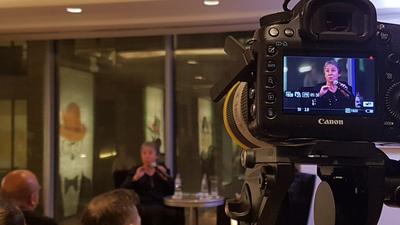Mohammed had always dreamed of a career in international football. At the age of 17, he was captain of Syria’s national youth team, despite being their youngest player. He was a striker, number 10 in the team, scoring a record 64 goals in 52 matches. But on 15 April he left all this behind, escaping Syria to risk everything on a rickety boat across the Mediterranean.
“Where is our star?”, “Our star shouldn’t have left us” and “He’s gone to Germany” are some of the posts on Mohammed’s Facebook page, alongside photos and videos showing his prowess on the football field.
Read an update about Mohammed in the New York Times
Bomb on the football pitch
At first Mohammed was so caught up in football that he took little notice of the war. But soon the conflict began to encroach on his daily life.
As he took the bus to his training sessions, explosions became more and more frequent – when this happened, he and the other passengers would throw themselves onto the floor between the seats.
One day, a bomb exploded on the football pitch in the middle of a match and one of his teammates died. Mohammed realised he did not want to carry on.
At the same time, Mohammed’s eighteenth birthday was looming, bringing with it the prospect of forcible conscription into the Syrian army.
Journey frought with risk
“We decided to leave Syria to protect Mohammed’s future,” says his father.
Accompanied by his father and uncle, Mohammed crossed the border to Turkey and made his way to the port city of Mersin, on the eastern Mediterranean.
A distance of just a few hundred kms, the journey took 24 hours and was fraught with risk. They had to cross the mountains on foot, bargain for transport and avoid human traffickers, all against a backdrop of gunfire and explosions.
In Mersin, they found a boat that would take them to Europe: an old merchant ship, into which they were squeezed with hundreds of other Syrians.
By day two, the boat had started to take on water. By the time they were rescued, the boat was barely afloat. It was five more days before they landed on the coast of Sicily.
Arriving in Italy
Mohammed sits on a camp bed in the migrants’ reception centre in Pozzallo, surrounded by Syrian families. On the wall behind him are pinned drawings, messages written in Arabic, Syrian flags, and a picture of a leaking boat with the legend ‘the death ship’.
Mohammed’s gaze is serious and determined; it suggests someone who, despite all the difficulties, will not easily give up on his ambitions.
“I hope that European clubs will read my story and help me pursue my dream to play football,” says Mohammed. “I would like to get to Germany and play for Borussia Dortmund, or to Spain and play for Real Madrid. I cannot go back to Syria – I feel like a deserter.”
Someone brings a ball. Mohammed starts to dribble the ball before bouncing it on his head, then transfers it expertly from foot to knee to shoulder.
A circle forms around him. The onlookers clap their hands and shout encouragement. For the first time, Mohammed smiles.
MSF in Sicily
More than 35,000 migrants crossed the Mediterranean to reach Italy between January and the middle of May this year; last year, more than 170,000 migrants landed on Italy’s shores.
Many of the people rescued from unseaworthy and overcrowded boats arrive on the island of Sicily. In the southern port of Pozzallo, migrants are greeted at the dock by an MSF medical team, working alongside staff from the Italian Ministry of Health.
The MSF team – made up of doctors, nurses and cultural mediators – screens the new arrivals for health issues and provides them with medical assistance, both in the hours after they disembark and during their stay in the primary reception centre.
In 2014, MSF teams in Italy screened 26,081 newly arrived migrants, and carried out 2,594 medical examinations and 700 mental health assessments. During the first three months of 2015, they conducted 1,349 health screenings and 566 medical examinations.
In the secondary reception centre in Ragusa province, where migrants await the results of their claims for asylum, an MSF mental health team of two psychologists is on hand to provide psychological support.
They provide both one-off counselling sessions and longer term support, and refer those with more serious mental health issues to a psychiatrist.
Read an update about Mohammed in the New York Times




